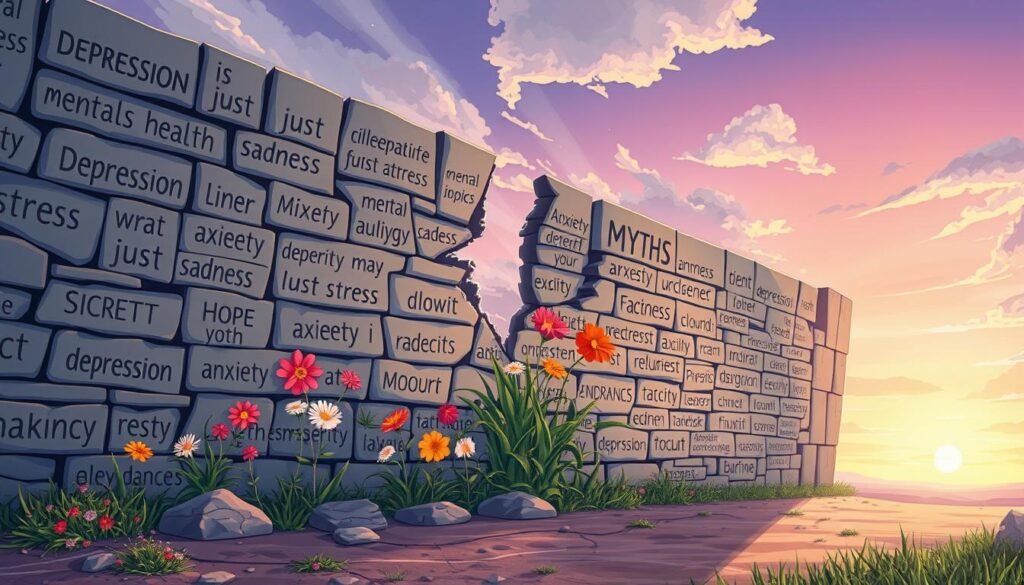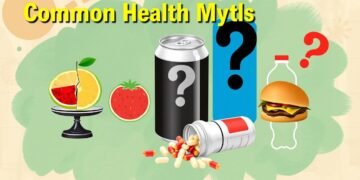Mental health has long been misunderstood. But as we learn more about our minds and emotional health, it’s key to know what’s true. In this article, we’ll look at common mental health myths and give you the facts to fight these harmful ideas.
Mental health issues affect millions globally. Yet, they’re often hidden by stigma and false information. By learning and tackling these myths, we can build a kinder, more understanding world for those facing mental health challenges.
Key Takeaways
- Mental health conditions are common and treatable, affecting millions of people worldwide.
- Addressing misconceptions and stigma surrounding mental health is crucial for promoting understanding and support.
- Accurate information and open discussions can help break down the barriers that prevent individuals from seeking the help they need.
- Prioritizing mental well-being is essential for overall health and happiness.
- Challenging mental health myths is a collective responsibility that can create a more compassionate and inclusive society.
Understanding Mental Health: Breaking Down the Basics
Mental health is key to our overall well-being, but it’s often misunderstood. Let’s dive into the science behind it and how it affects our daily lives.
The Science Behind Mental Well-being
Mental health is shaped by biology, psychology, and social factors. Mental illness misconceptions come from not understanding these. Our brain, with its complex systems, controls our feelings, thoughts, and actions. Problems in this system can lead to mental health issues.
Studies show that psychological well-being isn’t just about genetics or brain chemistry. Things like stress, trauma, and support from others also play big roles. Understanding these factors helps us appreciate the complexity of mental health and find better ways to care for it.
How Mental Health Affects Daily Life
Mental health deeply affects our daily lives, impacting our relationships, work, and happiness. People with mental health issues might find it hard to keep up routines, handle stress, or form strong connections. On the other hand, understanding mental health can lead to better work, stronger relationships, and more happiness.
By recognizing the importance of mental health and tackling misconceptions, we can support those who need help. This approach helps us understand mental health better, leading to more effective help and a better community.
Mental Health Myths: Separating Truth from Fiction
There are many wrong ideas about mental health. These ideas can make things worse. Let’s debunk mental illness misconceptions and separate facts from fallacies in mental healthcare.
One big myth is that mental illness shows a person is weak. But, mental health issues come from many things like genes and environment. They don’t show how strong or weak someone is.
Another myth is that people with mental health problems are violent. But, most people with mental illness are not violent. This myth can make people feel ashamed about their mental health.
- Myth: Mental illness is a sign of personal weakness.
- Fact: Mental health disorders are complex conditions with multiple contributing factors.
- Myth: People with mental illness are violent or dangerous.
- Fact: Most individuals with mental health issues are no more likely to be violent than the general public.
By debunking these mental illness misconceptions and separating facts from fallacies in mental healthcare, we can help people understand mental health better. This can make our society more caring and welcoming.

| Myth | Fact |
|---|---|
| Mental illness is a sign of weakness | Mental health disorders are complex conditions with multiple contributing factors |
| People with mental illness are violent or dangerous | Most individuals with mental health issues are no more likely to be violent than the general public |
“Mental health awareness is not just about understanding mental illness, but also about debunking the myths and misconceptions that can prevent people from seeking the help they need.”
The Impact of Stigma on Mental Health Treatment
Stigma is a big problem in mental health. It’s the negative views and beliefs about mental illness. This stigma stops people from getting help and treatment. We’ll look at how culture, social barriers, and the media add to these stereotypes.
Cultural Influences on Mental Health Perceptions
Different cultures see mental health in different ways. In some places, mental illness is seen as weakness, not a medical issue. This makes people afraid to talk about their struggles, fearing judgment.
Breaking Down Social Barriers
- Teaching the public about mental health is key to fighting stereotypes and misinformation.
- Starting open conversations and creating safe spaces helps reduce stigma. It encourages more people to seek help.
- Showing diverse mental health stories in media and sharing real experiences is also important.
The Role of Media in Perpetuating Stereotypes
The media greatly affects how we see mental health. Wrong or dramatic portrayals in movies, TV, and news can make things worse. We need better, more accurate and caring media coverage of mental health.
“Mental health conditions are not a character flaw or a sign of weakness – they are legitimate medical issues that require compassionate treatment and support.”

Depression and Anxiety: Beyond Common Misconceptions
Depression and anxiety are common but often misunderstood. It’s important to clear up myths about mental health. This helps give accurate info and fights stigma.
Many think depression is just a phase or can be overcome by willpower. But it’s a serious medical issue needing professional help. Anxiety isn’t just feeling nervous or worried. It’s a complex disorder that can really affect daily life.
Depression and anxiety have many causes. These include genetics, environment, and brain factors. Saying they’re due to weakness or lack of resilience is not true.
- Depression is not a sign of personal weakness or a “phase” that can be willed away.
- Anxiety is not just about being “nervous” – it’s a complex disorder that can significantly impact daily life.
- Both depression and anxiety have underlying biological and environmental contributors, not just a matter of mindset.
Understanding depression and anxiety helps us fight myths. It also lets us offer kind support to those affected.
| Myth | Fact |
|---|---|
| Depression is just a personal weakness. | Depression is a complex medical condition with biological, environmental, and psychological factors. |
| Anxiety is just worrying too much. | Anxiety is a distinct mental health disorder that can significantly impact daily functioning. |
| These conditions can be overcome through willpower alone. | Effective treatment, including therapy and medication, is often necessary for managing depression and anxiety. |

“Mental health is just as important as physical health, and we should treat it with the same care and attention.”
By tackling these myths, we can better understand and support those with depression and anxiety. We should encourage them to get the help they need.
The Truth About Mental Health Treatment Options
Many people believe wrong things about mental health treatment. But, the truth is there are many effective ways to get help. Each option has its own benefits and things to consider.
Modern Therapeutic Approaches
Talk therapy, or psychotherapy, is a key part of mental health care. Therapists use methods like cognitive-behavioral therapy (CBT) and dialectical behavior therapy (DBT). These help people cope with emotions and improve their lives.
These therapies work well for many issues, like depression, anxiety, and trauma.
Medication Facts and Misconceptions
Medicines like antidepressants and anti-anxiety drugs are important for mental health. Some worry about side effects or addiction. But, these fears are often not true.
When a doctor prescribes them, these medicines can be safe and helpful. They are part of a complete treatment plan.
Alternative Treatment Methods
- Mindfulness practices, like meditation and yoga, help reduce stress and improve mood.
- Herbal supplements and natural remedies, like St. John’s Wort and chamomile, might help with mental health. But, talk to a doctor first.
- Exercise, staying connected with others, and a healthy lifestyle also support mental health.
By clearing up myths about mental health treatment, people can make better choices. Seeking help and trying different approaches is a big step towards better mental health.

Mental Health in the Workplace: Debunking Professional Stigmas
In the workplace, mental health issues are often misunderstood. It’s time to break down these myths and see the value of mental health in the workplace. People with mental health conditions can be just as productive as anyone else.
Many believe those with mental health issues can’t handle work. But, with the right support, they can excel in their careers. By fighting against mental disorders stigmas, companies can help their employees reach their best.
Also, focusing on mental health at work helps everyone. Overcoming mental health stereotypes makes employees happier, more loyal, and more engaged. When people feel safe to ask for help, they can handle stress better and work more efficiently.

Employers are key in making a workplace that values mental health. They can do this by setting up mental health support programs, like:
- Confidential counseling services
- Mental health education and workshops
- Support for work-life balance and stress management
- Open talks about mental health
By tackling mental health stigmas and creating a supportive work environment, companies can make their teams more productive and resilient.
Children and Mental Health: Addressing Popular Myths
Children and teens face unique mental health challenges. Many myths and misconceptions can make it hard to help them early. Let’s clear up some common myths and highlight the need to support young minds.
Early Signs and Interventions
Mental health issues can start early. Busting common myths about psychological well-being, it’s key to spot early signs in kids. These include mood swings, trouble focusing, or changes in sleep and eating. Early help can manage these issues, helping young people to do well.
Supporting Youth Mental Health
Another myth is that kids and teens can handle everything on their own. In truth, a caring, supportive environment is vital for their mental health. This means talking openly, encouraging feelings, and getting them help when needed.
| Myth | Fact |
|---|---|
| Children are too young to experience mental health problems. | Mental health issues can develop at a young age, and early intervention is crucial for effective management. |
| If a child is struggling, they should be able to overcome it on their own. | Children and teens often need additional support and guidance to navigate mental health challenges. |
| Seeking professional help for a child’s mental health is a sign of failure. | Seeking professional support is a sign of strength and a commitment to a child’s well-being. |

By debunking these myths and mental illness misconceptions, we can help kids and teens thrive. Early help, care, and teamwork can help young people stay mentally healthy and resilient.
The Connection Between Physical and Mental Health
Our physical and mental health are closely connected. This is a fact that many people don’t realize. By separating facts from fallacies in mental healthcare, we can understand this better. This helps us improve our psychological well-being.
Physical health can affect our mental health. Chronic illnesses and pain can lead to depression and anxiety. On the other hand, poor psychological well-being can cause physical symptoms. This creates a cycle that’s hard to break.
- Poor sleep can lead to mental health issues like mood disorders and cognitive problems.
- Unmanaged stress can weaken our immune system and cause physical health problems. This worsens mental health issues.
It’s important to see how physical and mental health are connected. Healthcare professionals can create better treatment plans by addressing both. This way, we can understand human health better.
“The mind and body are not separate entities, but rather two sides of the same coin. One cannot be truly healthy without the other.”
As we separate facts from fallacies in mental healthcare, we must recognize the impact of physical health on our psychological well-being. By understanding this, we can improve our overall health and quality of life.

Supporting Loved Ones: Moving Past Misconceptions
When a loved one faces mental health challenges, it’s hard to know how to help. But, by overcoming common misconceptions and using effective communication, we can make a big difference. Creating safe spaces for open talks helps challenge mental health stigmas and clears up misinformation.
Effective Communication Strategies
Supporting a loved one with mental health issues starts with empathy, patience, and listening well. Don’t assume or give advice without being asked. Be careful with your words, avoiding things that might make their concerns seem less important. Show them you value their feelings and are there to listen and support without judgment.
Creating Safe Spaces for Discussion
Building trust and understanding is key when talking about mental health with loved ones. Make sure you’re fully present, without distractions, and create a welcoming space for honest talks. Let them share at their own speed, and offer emotional support without trying to solve their problems. Your role is to listen with compassion and be a source of strength, not a therapist.
By tackling mental health stigmas and misinformation, we empower our loved ones to get the help they need. With empathy, patience, and a listening ear, we can significantly impact their journey towards recovery.

“The most important thing is to listen. Often, just having someone who will listen without judgment can make a world of difference.”
Conclusion
In this article, we’ve looked at common mental health myths. These myths often confuse us and make it harder to talk about mental illness. By learning the truth, we better understand mental health and why we need to fight these myths.
We’ve seen how science and society affect our views on mental health. We’ve learned about different mental health issues, treatments, and how our bodies and minds are connected. Shattering these myths helps us create a kinder, more informed world for those facing mental health problems.
It’s important for us to keep learning and sharing what we know about mental health. By clearing up false ideas about mental illness, we help people feel more comfortable getting help. Let’s work together to build a society that values mental health as much as physical health.























































Discussion about this post